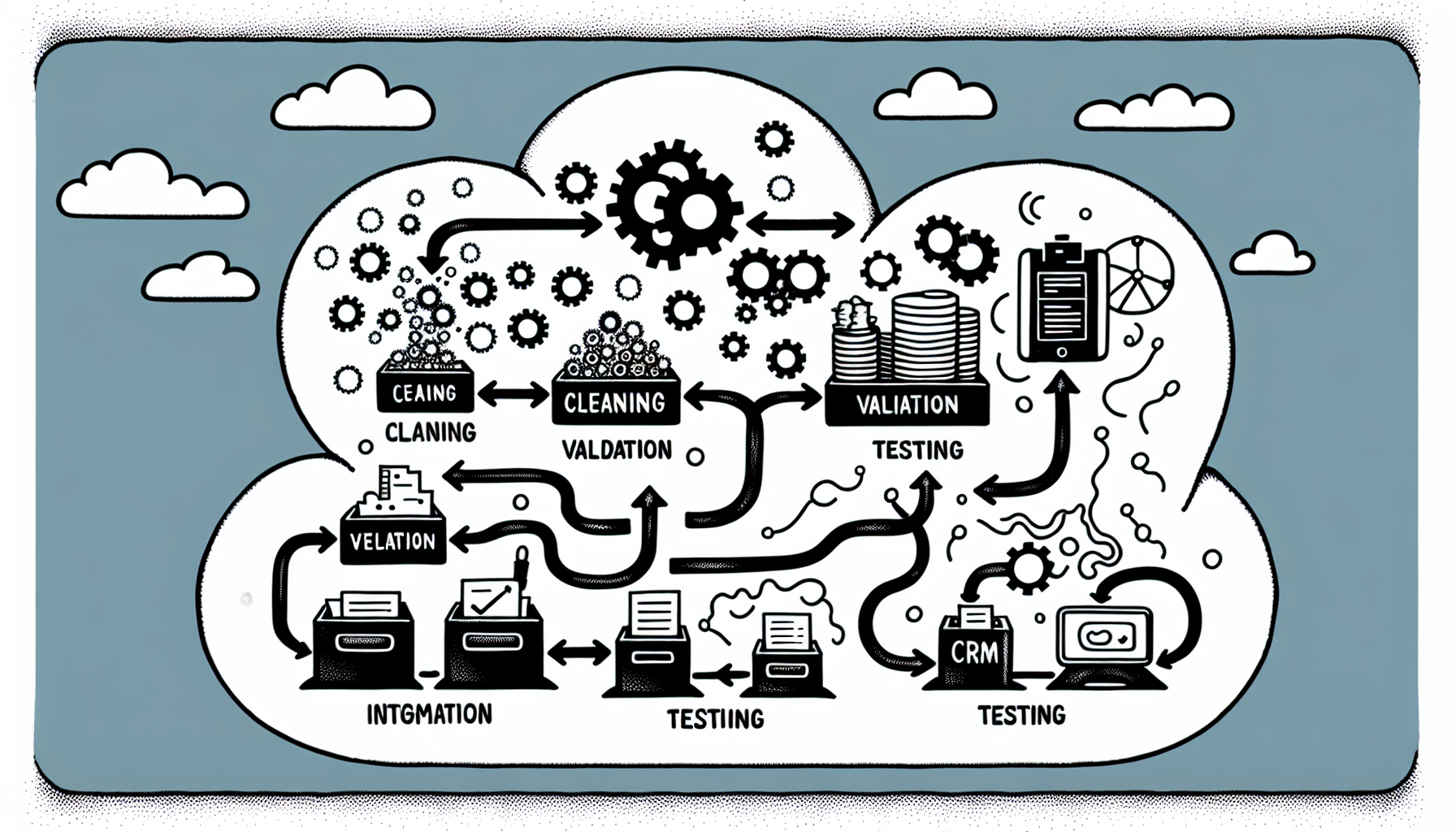
Maximizing Success: The Ultimate CRM for Insurance Agents Guide
Written by InvestGlass on .
Are you an insurance agent searching for a better way to handle client relationships, organize your sales pipeline, and boost your productivity? A CRM for insurance agents might just be the game-changer you need. Discover how leveraging the right CRM software can transform your workflow, enhance customer satisfaction, and drive revenue growth. In this guide, we’ll explore essential CRM features, top solutions in the market, and practical tips for CRM implementation in your insurance agency.
Key Takeaways
- InvestGlass CRM software is essential for insurance agents to improve client interactions, streamline workflows, enhance customer relationships, and drive sales growth, proving critical for efficiency and success in a competitive market.
- Key CRM features for the insurance industry include customization, integration with other platforms, automation of tasks, contact and policy management, and advanced reporting and analytics for data-driven decision making.
- Implementation of a CRM system is a comprehensive process that involves careful planning, stakeholder engagement, essential training and support, and strategic data migration and integration, aiming to maximize productivity and customer satisfaction.
The Importance of CRM for Insurance Agents

Today’s insurance agencies operate in a highly competitive market where customer expectations are ever-evolving, and efficiency is paramount. That’s where insurance CRM software comes into play. Insurance agents regard CRM tools as indispensable. They help to:
- Improve client interactions
- Increase overall business efficiency
- Streamline scattered workflows
- Increase productivity and revenue
The adoption of CRM software in the insurance industry leads to marked improvements in efficiency, exceptional customer service relationships, and overall business success.
Streamlining Workflows
One of the main benefits of CRM for insurance agents is workflow automation and streamlining. CRM software offers the following benefits:
- Automates tasks like notifications for follow-ups and interaction tracking
- Reduces time spent on repetitive tasks
- Minimizes manual tasks
- Increases productivity
Moreover, enhanced customer relationship- management (CRM) tools streamline communication, allowing agents to effectively manage follow-ups and stay abreast of client expectations. The result? A more organized workflow that enhances efficiency in customer service.
Enhancing Customer Relationships
CRM software significantly strengthens customer relationships by:
- Providing tailored services and personalized interactions
- Empowering insurance agents to enhance customer experiences
- Ensuring agents can conduct timely follow-ups and effectively address customer questions and concerns
- Consolidating communication mediums and purchase history
Additionally, CRM systems centralize contact information, creating logs of customer communications, accessible within the agency, which enhances transparency and customer experience. With predictive analytics features, CRM software helps insurance agents identify and act on potential customer churn, which is essential for maintaining high client retention rates.
Boosting Sales and Revenue
CRM systems also play a pivotal role in enhancing sales and revenue. Here are some ways in which they can help:
- Improved lead management through a centralized database that tracks prospects and enables personalized communication aids in prioritization based on lead value.
- CRM analytics identify trends and help in developing targeted strategies.
- Sales forecasting and trend spotting support planning and resource allocation for new campaigns.
CRM systems enable agents to make sales figures increase profits by leveraging client insights to identify and act on cross-selling and upselling opportunities. Ultimately, CRMs lead to significant sales growth through efficient lead conversion.
Key Features of an Effective Insurance CRM

Insurance CRM software is not merely a contact management tool— it’s a robust system that amalgamates several crucial features to streamline insurance operations. Key features include customization, allowing the tailoring of fields, workflows, and reports to specific needs. Robust integration options with other platforms like Google Apps and Quickbooks enhance the functionality of the CRM tool.
Specialized CRM features for insurance agents include sales automation, pipeline management, contact management, and telemarketing tools. Furthermore, the scope of CRM extends to marketing automation, lead management, customer service, and data analytics, providing predictive insights with AI and machine learning.
Contact and Policy Management
Effective insurance CRMs rely heavily on contact and policy management. Comprehensive contact and policy management provide a 360-degree view of policyholders, offering insights into coverage preferences, claim history, policy renewals, and other critical customer data. CRM systems centralize key information, allowing insurance agents to easily access imperative data viable for closing deals. They also offer customization options, such as creating custom fields for policy type and premium amounts or managing multiple policies using multi-page layouts.
Not to mention, efficient claims processing is facilitated by CRM systems, ensuring quick resolution and high customer satisfaction.
Automation and Integration
The effectiveness of CRM systems is amplified by their key features of automation and integration. CRM for insurance agents automates routine administrative tasks, freeing agents to concentrate on sales and relationship building. Marketing automations can be configured based on specified triggers, streamlining the prospecting process and aiding sales teams in more efficient deal closure.
Moreover, integration between CRM and policy management software bolsters business efficiency by simplifying processes, reducing manual data entry, and mitigating the duplication of efforts. Ensuring CRM compatibility with current tools and systems necessitates a thorough audit of the existing technology stack.
Reporting and Analytics
CRM systems offer invaluable insights through their reporting and analytics capabilities. These features enable data-driven operational decisions by providing insights into sales trends, customer behavior, and agent performance. User-friendly dashboards offer visual summaries of data crucial for predicting the performance of sales and other marketing campaigns and initiatives.
Advanced forecasting tools, like those in NetSuite CRM, anticipate sales trends and assist insurance agents in strategic planning in real-time. Through these insights, insurance professionals can optimize their strategies and operations to achieve their business goals.
Top CRM Solutions for Insurance Agents

Numerous CRM solutions, each with a unique blend of features and benefits, have become the preferred choices for insurance agents. These include:
- InvestGlass
- HubSpot CRM
- Salesforce Financial Services Cloud
- Zoho CRM
Each of these platforms is tailored to benefit insurance agents and insurance brokers by enhancing customer relationships, providing automation of processes, aiding in data-driven decisions, and streamlining sales processes.
Once they comprehend the strengths of these platforms, insurance agents can choose a CRM platform that aligns most closely with their agency’s needs and objectives.
InvestGlass
InvestGlass is the perfect CRM solution for insurance agents looking to streamline their sales process and enhance customer relationships. Its comprehensive suite of tools is designed to meet the specific needs of the insurance industry, offering unparalleled customization options and automation capabilities.
InvestGlass stands out with its robust policy and contact management features, enabling agents to maintain a 360-degree view of their clients, including detailed insights into policy details, coverage preferences, and claim history. This CRM solution empowers agents to deliver personalized services and foster strong customer relationships, which are essential for client retention and acquisition.
InvestGlass provides :
- web forms
- Customer management system or CRM
- automate workflows
- mobile crm
- forecast sales
- sales activities reporting
- instant broker portal
- communication history with SMS and email
- sales team territory to restrict fields and records visibility
The platform’s automation features significantly reduce the time spent on administrative tasks, allowing agents to focus on what they do best—selling insurance and building relationships. From automated follow-up reminders to streamlined claims processing, InvestGlass ensures that every client interaction is timely, efficient, and tailored to individual client needs.
Integration is another key strength of InvestGlass, as it seamlessly connects with various third-party applications and internal systems, ensuring a cohesive and interconnected workflow. This eliminates data silos and provides a unified platform for all customer-related activities, making it easier for agents to access and analyze critical client data together.
InvestGlass also offers powerful analytics and reporting tools that help agents track performance, identify sales opportunities, and make data-driven decisions. With real-time dashboards and customizable reports, agents can gain valuable insights into sales trends, customer behavior, and operational efficiency.
In summary, InvestGlass is the perfect CRM solution for insurance agents due to its ability to centralize and manage client relationships and information, automate routine tasks, integrate with other systems, and provide actionable insights through analytics—all of which contribute to increased productivity, improved customer satisfaction, and higher sales growth.
HubSpot CRM
HubSpot CRM stands out for its robust features, including:
- Inbound marketing capabilities
- Advanced lead management and segmentation
- Real-time activity tracking
- Automation
- Analytics
The free tools available through HubSpot CRM also include marketing automation capabilities, enabling seamless campaign management and engagement tracking.
As insurance agencies grow, HubSpot CRM offers the ability to upgrade to premium plans which include additional advanced features and resources.
Salesforce Financial Services Cloud
Salesforce Financial Services Cloud is a comprehensive CRM solution tailored to the needs of the financial services industry, including insurance agents. The platform offers features specifically designed to manage claims and policies efficiently within the insurance industry.
Salesforce CRM provides tools to grow an insurance business, manage customer data and streamline operations for a more productive workflow.
Zoho CRM
Zoho CRM offers a suite of tools tailored for insurance agents to effectively manage leads and deals, ensuring organized and trackable customer interactions. The platform enhances agent productivity by featuring an AI-powered sales assistant, which provides strategic insights and recommendations to prioritize leads for engagement.
Zoho CRM accommodates extensive customization to address the nuanced demands of the insurance sector and offers robust integration capabilities with the Zoho Suite and third-party applications through open REST APIs.
Implementing CRM in Your Insurance Agency

CRM system implementation in your insurance agency is a strategic endeavor that entails identifying business needs, offering training and support, and guaranteeing data migration and integration. It’s a step-by-step process that requires careful planning, coordination, and patience, but the rewards can be immense in terms of improved productivity, enhanced customer satisfaction, and increased sales and revenue.
Identifying Business Needs
Identifying your business needs is the initial step towards implementing a CRM system in your insurance agency. Engage with stakeholders from marketing, sales, and customer support to understand their challenges and involve them in the CRM selection process.
Understanding the sales process and customer journey, identifying key touchpoints, and interactions with customers at every stage is crucial before selecting a CRM.
Training sales agents and Support
After selecting the best CRM the system, it’s important to provide your team with extensive training. Training programs should include:
- Tailoring the training to the varying skill levels of the team members
- Hands-on practice to ensure proficiency
- Ongoing support to address any questions or issues as team members become more familiar with the CRM system.
Data Migration and Integration
In the CRM implementation process, data migration and integration are fundamental steps. Ensuring data quality by cleaning and validating existing data is crucial to avoid duplicates and errors during CRM integration.
Testing the data migration process on a smaller scale before a full rollout can help identify and fix any issues that might arise.
Measuring the ROI of CRM Implementation

When your CRM system is operational, measuring the return on investment (ROI) becomes crucial. This can be achieved by tracking key performance indicators (KPIs) related to sales, customer satisfaction, and marketing ROI.
The basic formula to measure the ROI for CRM in the health insurance sector is (Net return on investment / cost of investment) x 100.
Tracking Key Performance Indicators
Insurance agents need to monitor and measure performance using KPIs to track sales, customer satisfaction, and marketing ROI, allowing for strategic adjustments. Some vital KPIs for insurance agents to understand the financial impact of claims and set insurance rates include:
- Average cost per claim
- Claim frequency
- Components of claim costs
- Claims ratio
These KPIs help agents assess the financial health of their business and make informed decisions about client management.
Evaluating Customer Satisfaction
Another key aspect of measuring the ROI of CRM implementation is customer satisfaction evaluation. Improved customer experience due to CRM implementation can be assessed using metrics such as customer satisfaction levels, Customer Satisfaction Score, and Net Promoter Score.
Client satisfaction is often directly evaluated through surveys and is reflected in important KPIs like client retention and policy renewal rates.
Analyzing Sales Growth
Lastly, sales growth analysis can aid in the evaluation of CRM implementation’s ROI. CRMs contribute to higher sales productivity, increasing overall revenue per customer. Insurance CRM tools enhance the efficiency of the insurance sales cycle from lead generation to policy issuance, which leads to a higher volume of closed sales.
CRM systems also provide valuable metrics, such as the rate of sales calls to closure and time to close, offering insights into the efficiency of the sales process and its influence on growth.
Summary
In conclusion, CRM systems play a vital role in transforming the operations of insurance agencies. From streamlining workflows and enhancing customer relationships to boosting sales and revenue, the benefits of CRM are multifaceted. The key to maximizing success lies in selecting a CRM solution that aligns with your agency’s needs, effectively implementing it, and continuously measuring its ROI. The journey towards CRM implementation might seem daunting, but the results—increased productivity, improved customer satisfaction, and boosted sales—make it a worthy endeavor.
Frequently Asked Questions
What does CRM stand for in claims?
CRM stands for Customer Relationship Management, which is a technology used to manage interactions with customers and potential customers in the insurance industry.
What is the objective of CRM in insurance sector?
The objective of CRM in the insurance sector is to streamline the sales process, prioritize leads, and automate follow-ups to improve customer acquisition and retention.
What is Salesforce used for in insurance?
Salesforce is used in insurance to automate and streamline payment processes, including making payments and improving payment security.
What is CRM for insurance agents?
An insurance company with CRM system allows agents to effectively manage leads, nurture prospects, and convert them into paying customers. It centralizes data, simplifies workflows, and helps in organizing prospects and automating activities.
What are some top CRM solutions for insurance agents?
The top CRM solutions for insurance agents are InvestGlass, HubSpot CRM, Salesforce Financial Services Cloud, and Zoho CRM. These platforms offer specialized tools for managing client relationships and sales tasks effectively.